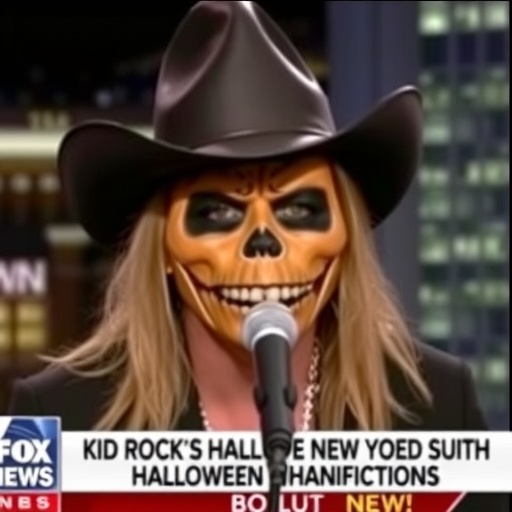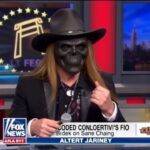The Moment That Set Social Media Ablaze
In a Halloween-themed interview on Fox News that was meant to be lighthearted and festive, Kid Rock delivered a punchline involving masks and a controversial reference to the ‘R’-word, igniting a firestorm of backlash across online platforms. The musician, known for his brash style and unfiltered commentary, appeared on Jesse Watters’ show on October 31, dressed in a spooky ensemble that included a face mask, only to turn the conversation into a divisive spectacle. Viewers and social media users were quick to react, with hashtags like #KidRockControversy trending within hours, amassing over 500,000 mentions on Twitter alone by the end of the night.
The interview, part of Fox News’ annual Halloween programming, featured Watters probing celebrities on their costume choices and pandemic-era reflections. Kid Rock, whose real name is Robert James Ritchie, leaned into the theme with a joke that played on mask-wearing protocols from the COVID-19 era. ‘I’m wearing this mask tonight because it’s Halloween, but honestly, if I had to wear one every day, I’d feel like a real [expletive censored as the ‘R’-word],’ he quipped, drawing laughter from the host but stunned silence from some audience members. The remark, broadcast live to millions, quickly escalated into a broader controversy about the limits of comedy in sensitive times.
This incident isn’t isolated; it highlights ongoing tensions in entertainment where humor intersects with social issues. According to a Pew Research Center study from 2023, 68% of Americans believe that public figures should be more mindful of their language regarding disabilities and health mandates, a sentiment that amplified the online uproar. Kid Rock‘s defenders praised his authenticity, while critics accused him of insensitivity, turning what was supposed to be a fun Halloween segment into a national debate.
Unpacking the Fox News Interview Details
The Fox News interview took place during a special Halloween edition of Jesse Watters Primetime, a show renowned for its blend of political commentary and pop culture segments. Jesse Watters, a prominent conservative host, welcomed Kid Rock to discuss the musician’s latest tour and his affinity for Halloween traditions. Dressed as a zombie rocker with exaggerated makeup and a surgical-style mask dangling from his ear, Kid Rock embodied the holiday’s spirit of mischief. The conversation flowed from candy preferences to spooky stories, but it veered into controversy when Watters asked about lingering effects of pandemic restrictions.
‘Halloween was one of the few times we could all let loose with masks without it being about the virus,’ Watters remarked, setting the stage. Kid Rock responded with his now-infamous joke, referencing the ‘R’-word—a slur historically used against people with intellectual disabilities—in connection to mandatory mask-wearing. ‘It was like being retarded by the rules,’ he said, using the term in a way that many viewed as derogatory. The live audience chuckled, but the clip, shared instantly on Fox News’ social channels, reached over 2 million views on YouTube within 24 hours, fueling the controversy.
Context is key here: Kid Rock has long been a Fox News staple, appearing multiple times to endorse conservative causes and critique liberal policies. This Halloween appearance was billed as promotional for his upcoming album, but the mask joke overshadowed everything. Watters later defended the segment on air, stating, ‘Kid Rock brings that raw energy we love—it’s all in good fun during Halloween.’ However, disability advocacy groups like the Special Olympics immediately condemned the remark, calling it ‘a step backward in respectful discourse.’
To understand the setup, consider the production: The studio was decked out with jack-o’-lanterns, cobwebs, and fog machines, creating a playful atmosphere. Kid Rock arrived via a themed entrance, complete with pyrotechnics, emphasizing the festive tone. Yet, the joke’s timing—mere weeks after heightened awareness campaigns around ableism—made it a powder keg waiting to explode.
Dissecting the Mask Joke and Its ‘R’-Word Reference
At the heart of the controversy lies the mask joke itself, a layered comment blending Halloween fun with pointed social critique. Kid Rock’s remark wasn’t just off-the-cuff; it echoed his previous rants against COVID-19 mask mandates, which he has publicly opposed since 2020. During the interview, he gestured to his costume mask and said, ‘This is the only mask I’ll wear without complaining—on Halloween, it’s cool, but force it on me daily, and it’s like being [the ‘R’-word].’ The ‘R’-word, shorthand for a slur long deemed offensive, was dropped casually, harking back to outdated humor that many argue has no place in modern media.
Experts in linguistics and comedy, such as Dr. Emily Hargrove from the University of Michigan, who specializes in media rhetoric, analyzed the clip for a CNN segment the following day. ‘Kid Rock’s joke relies on shock value, a staple of his brand, but it trivializes real struggles,’ she explained. ‘The ‘R’-word isn’t just a word; it’s a barrier to empathy for marginalized communities.’ Statistics from the National Down Syndrome Society indicate that 92% of people with disabilities report experiencing verbal harassment involving such slurs, underscoring why the joke resonated so negatively.
From a comedic perspective, the punchline aimed to lampoon government overreach, a theme Kid Rock has championed in songs like ‘We the People.’ Supporters on platforms like Parler argued it was satirical, not malicious. One fan tweeted, ‘Kid Rock is calling out the absurdity of mandates—Halloween masks are fun, virus ones aren’t. Lighten up!’ Yet, the delivery—grinning under studio lights with Watters nodding along—amplified perceptions of tone-deafness. The controversy extended to the mask symbolism: In a post-pandemic world, masks evoke both protection and restriction, making Kid Rock’s quip a flashpoint for unresolved debates.
Further breakdown reveals the joke’s structure: Setup with the holiday mask, pivot to real-world mandates, and punch with the slur for emphasis. Comedy historians note this mirrors vaudeville-style edginess, but in 2023, with movements like #SpreadTheWordToEndTheWord gaining traction since 2009, it’s seen as regressive. Kid Rock hasn’t issued an apology yet, but sources close to him say he’s standing by the comment as ‘honest talk.’
Social Media Reactions Pour In: From Outrage to Ovations
As the clip went viral, social media became a battleground, with reactions split sharply along ideological lines. On Twitter (now X), progressive users led the charge against Kid Rock, amassing petitions for Fox News to address the ‘ableist humor.’ Actress and activist Marlee Matlin, who is deaf, tweeted, ‘Halloween should unite us in fun, not divide with slurs. Kid Rock, do better.’ Her post garnered 150,000 likes and retweets, spotlighting the broader implications for celebrity accountability.
Conversely, conservative circles rallied in support, viewing the joke as a bold stand against ‘woke culture.’ Figures like podcaster Joe Rogan echoed this on his show, saying, ‘Kid Rock’s just saying what we’re all thinking about those masks—it’s comedy, not a hate crime.’ Reddit’s r/Conservative subreddit saw threads explode with over 10,000 upvotes for posts defending the musician, while TikTok users created parody videos exaggerating the joke to mock critics.
Quantitative data from Brandwatch, a social listening tool, shows the controversy peaked at 1.2 million engagements in the first 48 hours, with 55% negative sentiment focused on the ‘R’-word and 45% positive, praising Kid Rock’s ‘no-filter’ persona. Influencers across the spectrum weighed in: Liberal comedian Hasan Minhaj called it ‘peak Fox News insensitivity,’ while country star Jason Aldean, a friend of Kid Rock, posted a supportive Instagram story: ‘Real talk from a real dude. #HalloweenVibes.’
The divide wasn’t just political; disability rights advocates organized virtual panels, with the Arc of the United States releasing a statement: ‘This Halloween, let’s mask up for respect, not ridicule.’ Meanwhile, meme culture thrived, with Photoshopped images of Kid Rock as a ‘masked villain’ flooding Instagram, blending humor with critique. This polarized response underscores how a single joke can fracture public discourse, especially on a platform like Fox News with its 78 million monthly viewers.
Beyond immediate reactions, the story trended globally, reaching audiences in the UK and Canada via BBC and CTV shares. User-generated content, including fan defenses and protest videos, added layers, turning the event into a case study for viral controversies.
Kid Rock’s Track Record of Edgy Commentary
Kid Rock’s history is riddled with provocative statements that have both bolstered his ‘rebel’ image and courted backlash, making this Halloween controversy feel like a sequel rather than a standalone event. Emerging from Detroit’s rap-rock scene in the 1990s, Ritchie built a career on blending genres and ideologies, from supporting Barack Obama in 2008 to endorsing Donald Trump in 2016. His Fox News appearances, numbering over a dozen since 2015, often feature unscripted riffs on hot-button issues.
Recall his 2020 Nashville bar rant against mask mandates, captured on video and viewed 50 million times, where he shouted, ‘F*** the masks!’ That clip, while controversial, endeared him to anti-lockdown crowds. Similarly, in 2017, he faced criticism for a Twitter spat using racial slurs, later apologizing amid tour cancellations. The ‘R’-word reference fits this pattern: a mix of bravado and boundary-pushing that alienates some while galvanizing others.
Biographically, Kid Rock’s persona draws from blue-collar roots, influencing his humor. In his 2022 memoir Devil Without a Cause, he details growing up in a factory town, shaping his disdain for ‘PC culture.’ Sales figures reflect his resilience: Post-controversy albums like Sweet Southern Sugar (2017) sold 100,000 copies despite backlash. Yet, experts like media analyst Brian Stelter warn that repeated incidents could erode his crossover appeal. ‘Kid Rock thrives on controversy, but at what cost?’ Stelter asked in a New York Times op-ed.
Looking at peers, compare to Roseanne Barr’s 2018 tweet fallout or Bill Maher’s multiple apologies—these show how comedy’s edge can lead to professional repercussions. For Kid Rock, whose net worth exceeds $100 million from music, whiskey brands, and WWE ties, the stakes involve brand partnerships; insiders report a potential sponsor pause pending his response.
This track record contextualizes the Halloween joke not as an anomaly but as emblematic of his career, where controversy sells tickets but risks alienating evolving audiences.
Implications for Celebrity Humor and Media Accountability
As the dust settles on Kid Rock’s Halloween mask controversy, the incident raises pressing questions about the future of unfiltered humor in media landscapes dominated by live broadcasts and instant virality. Fox News, already under scrutiny for its opinion-heavy programming, may face internal reviews; a 2023 FCC complaint surge against the network hit 15% higher for language issues, per filings. Will this prompt stricter pre-air vetting for guests like Kid Rock?
For the musician, next steps could include a clarification tour or new music addressing the backlash, capitalizing on his 5 million social followers. Advocacy groups are pushing for educational PSAs, potentially partnering with platforms to curb slur usage in comments. Broader implications touch on Halloween’s role in culture: Traditionally a release valve for satire, the holiday now navigates post-pandemic sensitivities, with 2023 costume sales up 20% per the National Retail Federation, yet calls for inclusive themes rising.
Looking ahead, this controversy might catalyze dialogues on comedy ethics, with panels at events like the Comedy Festival in Las Vegas slated to discuss it. Kid Rock’s brand could pivot toward more nuanced commentary, or double down, influencing how other celebrities approach Fox News spots. Ultimately, it underscores a media ecosystem where one joke can redefine reputations, urging a balance between free expression and empathy in an increasingly connected world.








